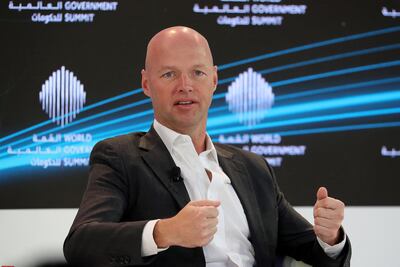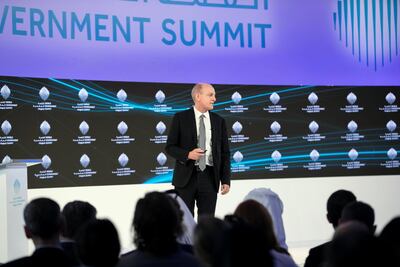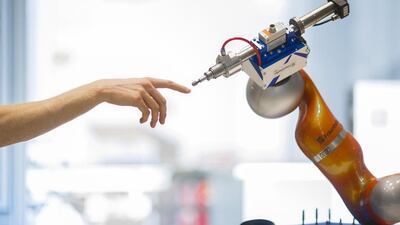From understanding human’s minds to managing our people-to-people relationships and detecting diseases, artificial intelligence will revolutionise the way cities, education and healthcare operate, according to leading experts in the field.
Speaking at the World Government Summit on Monday, they said scientists have only “scratched the surface” of what is potentially feasible in the near future.
“I see the democratisation of everything from food and health to education and housing and as we do this, we will find ourselves becoming very creative,” said Sebastian Thrun, a German innovator and chief executive of Kitty Hawk Corporation, which aims to bring the flying car.
"I wish I was born 50 years from now because it's a very exciting time. We might eventually be able to upload the human brain onto a machine and in that sense, have it enter immortality – technology is unstoppable."
In healthcare, he spoke about a pervasive diagnostics environment where people would receive medical exams while driving, sleeping or showering.
“I lost my 51-year-old sister to cancer last year,” he said.
“When she finally spotted it, it was too late to intervene. It’s the second largest killer in the United States because it’s so hard to detect.
"As a society, we have to understand the best way to make AI beneficial for all people and we can even find a solution to live twice as long.”

In education, AI will help solve the shortage in highly-skilled teachers.
“The education system is broken in so many ways,” said Mr Thrun, who is also chairman and co-founder of Udacity, an educational organisation offering open online courses.
“We [won’t] have to learn spelling or multiplication anymore, we can use AI to tailor educate people.
"Humans are wired to learn, they’re sponges of information and it will be so fun that we will rather learn than play games.”
He spoke of reducing the number of teachers from educating 30 children at a time to five for an improved outcome.
The human race has invested one trillion person-years in teaching and learning but today, technology is being leveraged to make education an individual experience.
“There’s an increasing shortage of highly-skilled teachers and institutions,” he said.
“Only 17 countries in the world can say they host the top 100 universities – I see a shortage of highly-skilled educators in the Arab world and I want to change that.”
_____________
Read more from World Government Summit:
Life on Mars likely to mean living under ground
Why being the world's only cyborg can be a real headache
'Innovative or be eliminated': UAE's smaller health clinics will struggle to survive
_____________
Last October, the UAE launched a project to help train one million young Arabs in the language of the future: computer programming.
“Anything you learn in school today will be out in five years from now,” he added.
“There’s an incredible rejection of technology in education – they believe in face to face. But with technology, children can learn at their own pace so the time for complacency in education is over.”
Transportation will also transform drastically, with one in nine jobs in the US said to change when self-driving cars are deployed.
“The world will look very different 10 years from now,” Mr Thrun said.
“Education is almost free to access, poverty is in decline, people in the developed world live twice as long as our grandparents’ generation – all these things are moving ahead and it’s not going to stop.”

According to Stuart Russell, professor of computer science in electrical engineering at UC Berkeley, also said: “We will see more as these capabilities mature – like a digital assistant that can read your emails, understand your conversations and keep track of your activities and relationships with people.”
In cities, AI will lead to massive changes as Uber estimates a ten-fold reduction in the price of its trips.
“It effectively becomes free to move around the city and we no longer need to own a car,” he said. “It’s like when we use electricity – we don’t own an electric power generation system.
"That will enable mass transit systems to function better because they don’t need to be fed by people driving to a train from suburbs – you can use autonomous vehicles which is efficient in terms of volumes of people needed to be moved.”
In 3D printing and manufacturing, AI will dramatically reduce the cost of physical objects with the creation of plastic, metal, glass and semi-conductor objects.
“The scope for inventing new physical objects that could never be made before is unbelievable,” Mr Russell said.
“We’ll be able to make things at home like a cast for a broken arm, a shoe, which already exists with Adidas, an entire bicycle and decorative objects. If every house is effectively a universal factory, it can make a city more resilient.”
However, humans will ultimately remain the most important component of a city’s function.
“As of yet, we don’t have good models for representing and controlling the city,” he added. “We also don’t know what the city should be optimising so we need different types of decision-making algorithms and we must also be aware of progressive enfeeblement so empower and enable but don’t envelop.”

